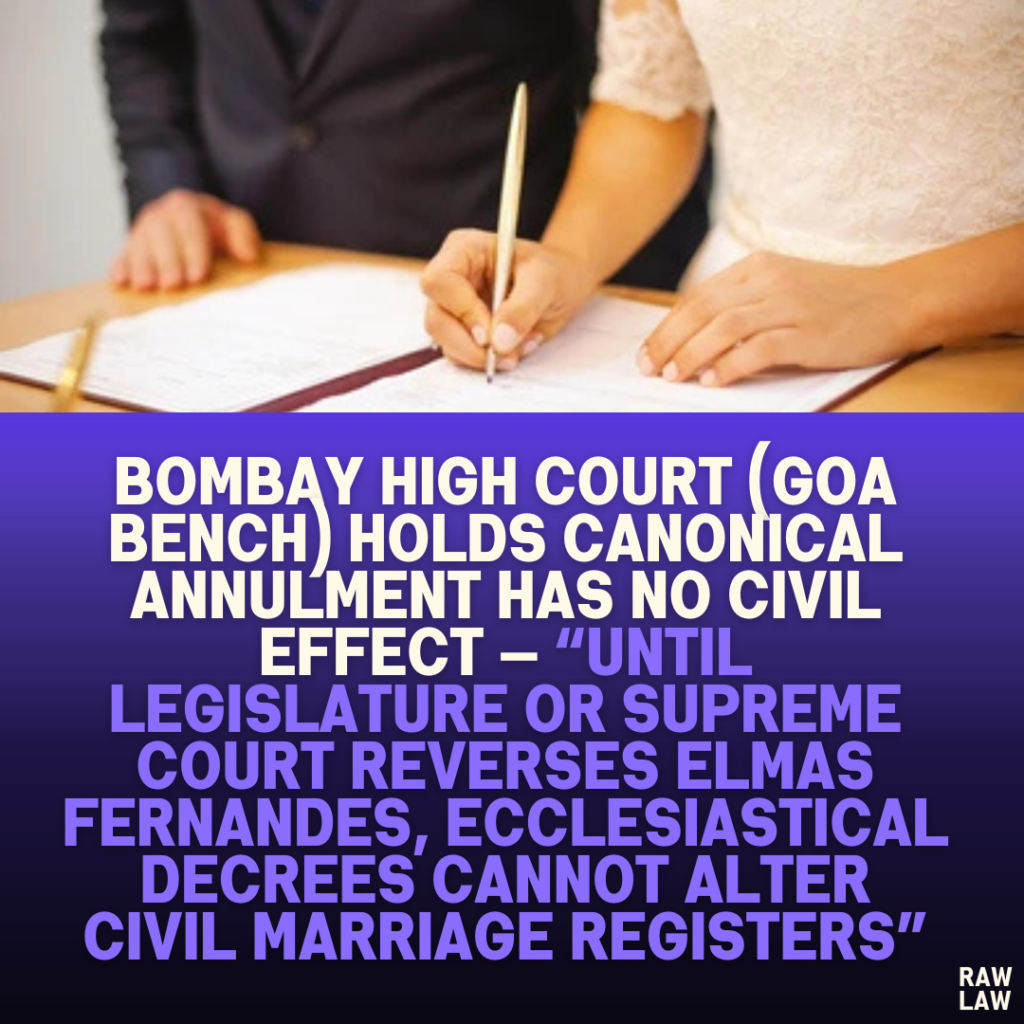Court’s Decision
The Bombay High Court at Goa dismissed a writ petition seeking a direction to the Civil Registrar of Tiswadi to strike off and cancel the entry of a marriage in the civil register, based solely on an annulment decree passed by the Ecclesiastical Tribunal. The Court held:
“Once Article 19 has been entirely struck down, the orders of such Tribunals now do not receive the imprimatur of the High Court and therefore would not have civil consequences.”
Accordingly, the petition was dismissed, holding that:
“The Order/Affirmative sentence of the Ecclesiastical Tribunal… would have no civil effects. Consequently, the Civil Registrar… has rightly refused to endorse the entry in the Register of Marriages.”
Facts
The petitioner had solemnized a Canonical Marriage in 2017 under the Law of Marriage (Decree Law No. 35461) applicable in Goa. This marriage was transcribed into the Civil Marriage Register. Subsequently, the petitioner obtained an annulment decree from the Ecclesiastical Tribunal, confirmed by the Metropolitan Tribunal. Based on this, she requested the Civil Registrar to cancel the entry of her marriage from the civil register.
The Civil Registrar declined the request, citing the High Court’s ruling in Elmas Fernandes v. State of Goa, where Article 19 of the Decree Law—which previously allowed ecclesiastical decisions to be endorsed and enforced via the High Court—was declared unconstitutional. Hence, the Registrar contended that such annulment could not be given civil effect without High Court ratification, which was no longer legally possible.
Issues
Whether a decree of annulment passed by the Ecclesiastical Tribunal, after the striking down of Article 19 of Decree Law No. 35461, can have civil effect enabling cancellation of a marriage entry in the Civil Marriage Register without High Court ratification.
Petitioner’s Arguments
- Continuing Validity of Ecclesiastical Decrees: The petitioner contended that even after the striking down of Article 19, the annulment decree remained legally effective under Canonical Law and should be given civil effect without High Court endorsement.
- Violation of Fundamental Rights: It was argued that the Registrar’s refusal infringed the petitioner’s rights under Articles 14 and 21 of the Constitution, as it deprived her of the right to remarry and have a family.
- Effect of Elmas Fernandes: Counsel argued that the High Court in Elmas Fernandes held the Decree Law to be valid even without Articles 4 and 19, and thus civil effects could still follow.
- Unnecessity of High Court Endorsement: It was contended that the deletion of Article 19 eliminated the need for High Court ratification, not the civil effect itself.
Respondent’s Arguments
- No Civil Effect Without Article 19: It was argued that the annulment decree cannot be treated as having civil effect absent the statutory mechanism—Article 19—allowing the High Court to direct enforcement.
- High Court’s Role Was Judicial, Not Ministerial: The Amicus Curiae stressed that the High Court’s role under Article 19 involved judicial oversight, and its removal meant the Ecclesiastical orders could no longer impact civil status.
- Registrar’s Refusal Was Lawful: The Civil Registrar argued that her refusal was justified since there was no statutory basis left to act on an ecclesiastical decree post-Elmas Fernandes.
Analysis of the Law
- The Court reviewed Articles 2, 4, and 19 of Decree Law No. 35461 and reaffirmed that these provisions formerly provided a dual system where marriages could be solemnized either civilly or canonically, with Article 19 bridging ecclesiastical annulments with civil consequences via High Court ratification.
- With the striking down of Article 4 (by Espiciosa Nunes v. Francisco Nicolau Fernandes, AIR 1974 GDD 46) and Article 19 (by Elmas Fernandes), there remained no mechanism to give civil effect to Canonical annulments.
- The Court emphasized that under the previous scheme, the High Court’s role was supervisory and essential for giving such ecclesiastical decisions civil effect.
Precedent Analysis
- Espiciosa Nunes v. Francisco Nicolau Fernandes (AIR 1974 GDD 46): Struck down Article 4, holding that Canonical marriages do not eliminate the civil right to divorce.
- Elmas Fernandes v. State of Goa: Declared Article 19 unconstitutional for violating Articles 14 and 21 of the Constitution, as it restricted judicial review and rendered the High Court merely an administrative transmitter.
- The Archbishop Patriarch of Goa v. State Information Commission (2023 SCC OnLine Bom 1694): Cited to analyze the public character of ecclesiastical authorities post-striking down of Article 19.
Court’s Reasoning
- The Court rejected the petitioner’s claim that ecclesiastical decrees remain executable without High Court involvement, noting:
“The scheme of Chapter II… was to give civil effect to orders of the Canonical Court/Ecclesiastical Courts through the provisions of Article 19… Once Article 19 has been entirely struck down… [such orders] would not have civil consequences.”
- The Court clarified that Elmas Fernandes had specifically held that Article 19 imposed an unconstitutional bar on judicial review and had been struck down in full.
- Until any legislative amendment or Supreme Court ruling reverses the effect of Elmas Fernandes, the High Court ruled that Ecclesiastical annulment decrees could not alter civil registers.
Conclusion
The High Court dismissed the writ petition, upholding the Registrar’s refusal and holding:
“The Order/Affirmative sentence of the Ecclesiastical Tribunal… would have no civil effects.”
Implications
- This ruling effectively suspends the civil enforceability of Canonical annulments in Goa unless endorsed by future legislative or constitutional interventions.
- Parties married under Canon Law in Goa must now seek civil divorce for civil register modifications unless Article 19 is constitutionally restored or replaced.
- The judgment reinforces the High Court’s supervisory role and constitutional commitment to due process and review, even in personal law systems influenced by religion.




Pingback: Delhi High Court Holds Invalid Reference to Swiss Authorities Cannot Extend Time for Assessment: “A Request Made by the Revenue to Swiss Authorities for Information Under Article 26 of the Indo-Swiss DTAA Concerning Periods Prior to 1st April 2011 Was